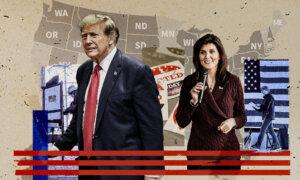The Republican said President Trump must now earn the votes of those who did not support him.
Republican presidential candidate Nikki Haley ended her 2024 bid on March 6—without backing the party’s presumptive nominee, former President Donald Trump.
Ms. Haley delivered the news in a brief speech before supporters in Charleston, South Carolina.
“I am filled with the gratitude for the outpouring of support we’ve received from all across our great country. But the time has now come to suspend my campaign,” she said. “I said I wanted Americans to have their voices heard. I have done that. I have no regrets. And although I will no longer be a candidate, I will not stop using my voice for the things I believe in.”
Ms. Haley’s announcement comes a day after Super Tuesday—the day consisting of the most primaries in the presidential election cycle—in which President Trump swept all but one of the races.
Acknowledging that the former president would likely become the Republican nominee, Ms. Haley congratulated him on the achievement and wished him well, but stopped short of an endorsement.
“I have always been a conservative Republican and supported the Republican nominee,” she said. “But on this question, as she did on so many others, Margaret Thatcher provided some good advice when she said, ‘Never just follow the crowd. Always make up your own mind.’
“It is now up to Donald Trump to earn the votes of those in our party and beyond it who did not support him. And I hope he does.”
Noting that he had “trounced” Ms. Haley the night before, the former president said, “At this point, I hope she stays in the ‘race’ and fights it out until end!”
Still, he invited Ms. Haley’s supporters to join him in his efforts to defeat President Joe Biden in November, whom he called “the enemy.”
“HE IS DESTROYING OUR COUNTRY,” he wrote. “MAKE AMERICA GREAT AGAIN!!!”
Narrowing the Field
The former South Carolina governor launched her campaign in February 2023, making her the first major GOP candidate to jump into the race after President Trump. She was also the only female candidate in the Republican contest.
Among the double-digit field of contenders, Ms. Haley initially struggled to gain traction. But at the first primary debate in August, she had a breakout moment.
Her stance on abortion, in particular, gained the support of the more moderate crowd. She noted that without a majority in the House, 60 Senate votes, and the White House, the GOP cannot enact a national abortion ban. The focus, she said, should be on reaching consensus for a general acknowledgement that late-term abortions should be banned, adoptions encouraged, and contraceptives made available. Meanwhile, medical professionals, she said, should be allowed to practice according to their consciences, and women should not be jailed for having abortions.
That position drew criticism from some conservatives, who found it to be inconsistent with Ms. Haley’s claims of being “unapologetically pro-life.” But for those with a more liberal stance on the issue, her comments were seen as an olive branch.
As the first primary contests approached, Ms. Haley climbed in the polls until she was neck-and-neck with Florida Gov. Ron DeSantis for second place. And although she came in third in Iowa, it was difficult to tell from her remarks.
“I can safely say, tonight, Iowa made this Republican primary a two-person race,” she declared as the results poured in.
Her words were soon validated by entrepreneur Vivek Ramaswamy and Mr. DeSantis, who dropped out of the race before the New Hampshire primary a week later.
There, Ms. Haley lost by 11 points, though again, her speech told a different story. Stressing that the race was “far from over,” she said her campaign was “just getting started.”
But by the time she achieved her first primary victory in the District of Columbia on March 3, the writing had been on the wall for some time.
When the votes were tallied on Super Tuesday, it was expected that an announcement of her campaign’s suspension would soon follow.
Pitfalls
While Ms. Haley ran a frank-but-positive campaign, it was not without controversy.
One of the biggest missteps was when she failed to identify slavery as the primary cause of the Civil War at a New Hampshire town hall in December.
“I think the cause of the Civil War was basically how government was going to run—the freedoms and what people could and couldn’t do,” Ms. Haley replied when a voter asked her thoughts on the matter.
When pressed further, she launched into a lengthy explanation about the role of government and the importance of individual freedom. But again, she neglected to mention slavery—a fact the voter said he found “astonishing.”
Ms. Haley later clarified that “of course the Civil War was about slavery,” but by that point, the damage had been done.
The controversy grew the following month, when Ms. Haley said that the United States has “never been a racist country.” When asked by The Epoch Times if the comment was a slip of the tongue, the former U.S. ambassador to the United Nations answered, “No.”
“Listen, I was born a brown girl in a small rural town in South Carolina. … Did we face racism? Yes,” said Ms. Haley, whose parents immigrated to the United States from India.
“But what I can tell you is that brown girl that grew up in that small rural town grew up to become the first female minority governor in history, went on to become U.N. ambassador, and is now running for president of the United States. I don’t want any brown, black, or other child thinking they live in a racist state.”
The candidate went on to say that while there is racism in America, it is not systemic and there is equal opportunity for everyone.
But for many Republican voters, another turnoff was Ms. Haley’s age-based criticism of President Trump.
Although she largely refrained from attacking the former president at the start of her campaign, that changed in the weeks leading up to the Iowa Caucus in January. From then on, she frequently compared President Trump to President Joe Biden—who is widely believed to be in a state of cognitive decline—arguing that it was time for a “new generation” to take the reins.
“Trump and Biden are two old men who are only getting older,” she said at a Feb. 20 campaign event while explaining her reasons for staying in the race.
“We’ve all seen them fumble their words and get confused about world leaders. That’s not who you want in the Oval Office when Russia launches a nuclear weapon at our satellites or China shuts down our electricity grid.”
Days later, at the Conservative Political Action Conference in Washington, Alaska resident Barbara Burg told The Epoch Times that she found those criticisms to be unfair.
“I think she’s saying a lot of things that are hurtful and perhaps untrue about Trump,” said Ms. Burg, who initially considered voting for Ms. Haley. “I mean, yes, he’s older. Yes, he’s almost Joe Biden’s age, but his intellect is still strong. His mind is strong.”
Looking ahead, Ms. Haley could run again in 2028. Perhaps after four years the dust will have settled enough for voters like Ms. Burg to give her another shot. But given President Trump’s continued hold on the Republican Party, the likelihood of that is uncertain.
Original News Source Link – Epoch Times
Running For Office? Conservative Campaign Consulting – Election Day Strategies!


